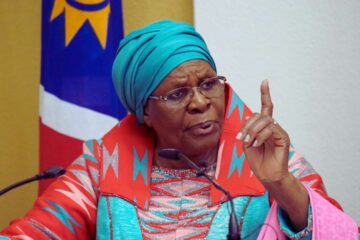Allexer Namundjebo
A report adopted by the National Council has revealed growing nicotine addiction among children of schoolgoing age, with some as young as ten saying their bodies “don’t function well” without smoking.
Hans Nambodi, Chairperson of the National Council Standing Committee on Health, Social Welfare, and Labour Affairs, presented the report last week. It outlines the rising use of vapes and hookah pipes and their side effects.
During consultations in the Khomas, Hardap, and Erongo regions, learners admitted to hallucinating and acting abnormally when they don’t smoke.
Others said they use these substances to deal with stress and anxiety.
“Some teachers indicate that learners as young as ten smoke hubbly. Some also observed learners coming to school high, but nothing is done because they can be dangerous when on drugs,” the report said.
Teachers said some learners become aggressive and are hard to control when under the influence.
The committee now recommends a full ban on the sale, import, use, hire, advertising, and open display of vapes, hookah pipes, and similar products.
It also wants the Tobacco Products Control Act No. 1 of 2010 reviewed to include electronic smoking devices and other new tobacco products.
Health experts have backed the findings. Professor Richard Van Zyl-Smit, a pulmonologist and head of adolescent respiratory services in South Africa, said vaping and hookah use expose children to harmful toxins like nicotine, which can damage growing lungs and brains.
“Adolescent lungs are still developing, and exposure to unnecessary toxins during this growth phase should be avoided at all costs,” he said.
Hookah smoking is often considered a safer choice than cigarettes, but recent studies argue that it leads to more exposure to carbon monoxide, tar, heavy metals, and cancer-causing agents.
Long-term use increases the risk of oral, lung, and heart diseases.
The National Council’s move follows failed efforts in the past to tighten tobacco laws. Some lawmakers feared a total ban would lead to black market sales. Instead, they called for education campaigns, counselling, and support programs.
Still, support for a ban is growing.
“We are not declaring war on the youth. We are declaring war on addiction and the harmful culture that is robbing them of their health and future,” said member of parliament Elma Dienda.
She has called for a full ban on hubbly bubbly in Namibia.
“I saw a mother and her children sitting under a tree. I thought they were passing an asthma pump around when I saw the mother passing it to the child. I thought the whole family had asthma, not knowing that it was a hubbly-bubbly pipe,” she said.
Former deputy health minister Esther Muinjangue previously told lawmakers that although hookahs are regulated under the current act, enforcing the law is still a challenge.
This had resulted in the ministry starting a public campaign to warn about the dangers, especially for minors.
Youth activists have also spoken out. Activist Julius Natangwe said, “I support the banning of that nonsense. It’s a serious distraction to society. Even school kids are using that nonsense. It doesn’t have any advantage,” he said.




